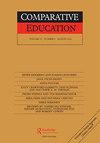Education in radical uncertainty: transgression in theory and method
IF 3.7
1区 教育学
Q1 EDUCATION & EDUCATIONAL RESEARCH
引用次数: 0
Abstract
lifetime ’ s work. Identity is a lifelong process – a project – of self-realisation. Moreover, it is a process of self-realisation that relies crucially on mutual recognition. Identity is formed in the space between the ‘ I ’ and the ‘ me ’ : the space between the self-a ffi rmation of the subjective self and the self that is perceived objectively by other subjective selves. We become ourselves within this inter-subjective – and linguistically organised – space. For, Auerbach network theory fails to grasp the fragility, super-complexity, and relationality of this space. He hangs on to the more homely notion of ‘ neighbourhood ’ : the crucial distinction being that ‘ I belong to the neighbourhood, whereas the network belongs to me ’ . An earthly neighbourhood with all its complex intertwining of belongingness and responsibility is, argues Bauman, what I belong to whether I like it or not. It is part of my belonging within the world. In these fi nal re fl ections by a great public intellectual and scholar there is – as always in his work – a sense of the unpredictability and precarity of our human world. For those interested in the methodology of comparison his work is of fundamental importance because of its insis-tence on the irreducible interconnectivity of the human, the social and the political. The ques-tion Bauman leaves me with is: how in a world where everything is connected with everything else – and where connectivity and con fl ict are inextricably entwined – might we fi nd the grounds to compare anything with anything? Are we not, rather, left with the incomparable di ff erences that comprise our in fi nitely varied world?极端不确定性中的教育:理论与方法上的越轨
这是一辈子的工作。身份认同是一个终身的自我实现过程——一个项目。此外,这是一个自我实现的过程,关键依赖于相互承认。身份是在“我”和“我”之间的空间中形成的:主观自我的自我确认和被其他主观自我客观感知的自我之间的空间。我们在这个主体间和语言组织的空间中成为我们自己。因为,奥尔巴赫网络理论未能把握这个空间的脆弱性、超复杂性和关联性。他坚持“邻里”这个更朴素的概念:关键的区别在于“我属于邻里,而网络属于我”。鲍曼认为,无论我喜欢与否,一个充满归属感和责任的尘世社区都是我的归属。它是我在这个世界上的归属感的一部分。在这位伟大的公共知识分子和学者的这些最后的反思中——正如他的作品中一贯的那样——我们人类世界的不可预测性和不稳定性。对于那些对比较方法论感兴趣的人来说,他的工作是至关重要的,因为它坚持人类、社会和政治之间不可简化的相互联系。鲍曼留给我的问题是:在一个万物相互联系的世界里——在连通性和冲突不可避免地纠缠在一起的世界里——我们如何才能找到将任何事物与任何事物进行比较的理由呢?相反,我们不是留下了构成我们这个千变万化的世界的无可比拟的差异吗?
本文章由计算机程序翻译,如有差异,请以英文原文为准。
求助全文
约1分钟内获得全文
求助全文
来源期刊

Comparative Education
EDUCATION & EDUCATIONAL RESEARCH-
CiteScore
7.40
自引率
21.20%
发文量
35
期刊介绍:
This international journal of educational studies presents up-to-date information with analyses of significant problems and trends throughout the world. Comparative Education engages with challenging theoretical and methodological issues - and also considers the implications of comparative studies for the formation and implementation of policies - not only in education but in social, national and international development. Thus it welcomes contributions from associated disciplines in the fields of government, management, sociology - and indeed technology and communications - as these affect educational research and policy decisions.
 求助内容:
求助内容: 应助结果提醒方式:
应助结果提醒方式:


